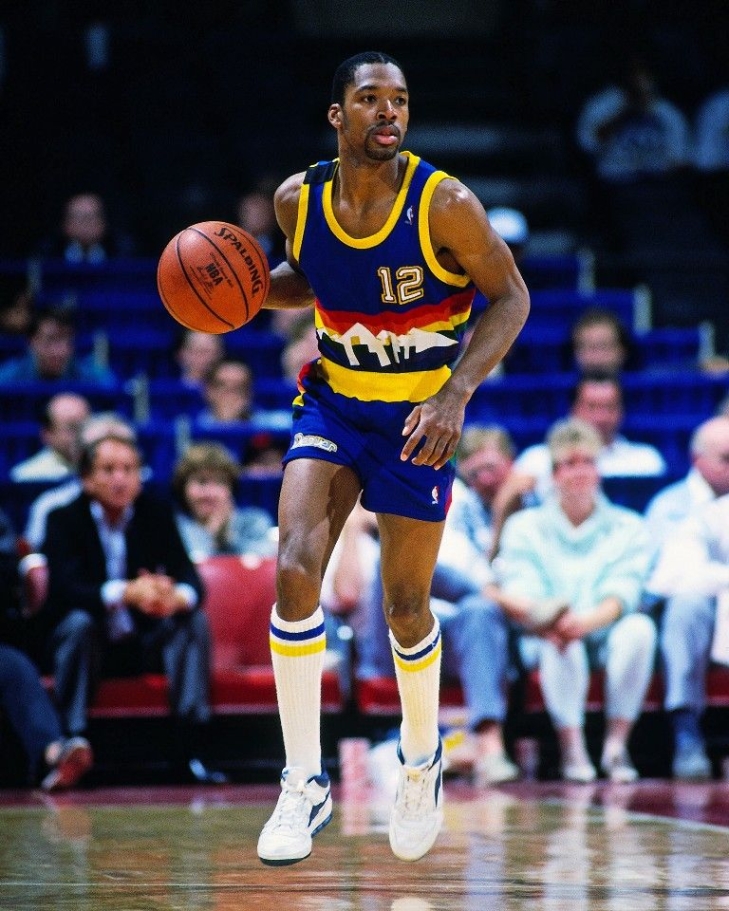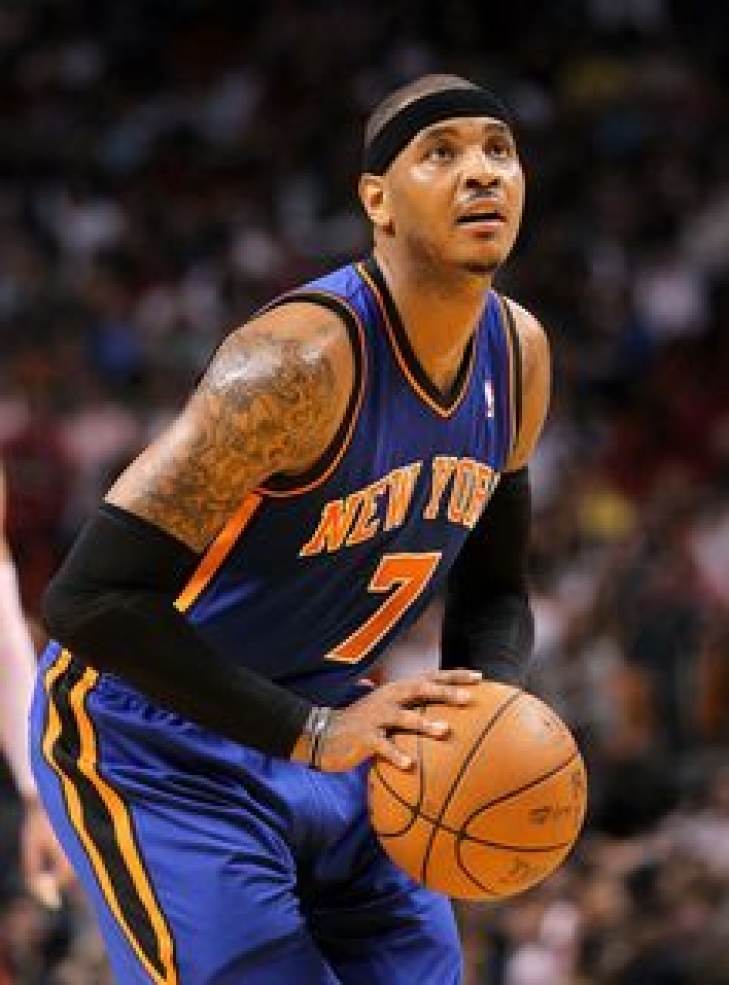102. Fat Lever
Lafayette “Fat” Lever was a two-time All-PAC 10 Selection at Arizona State, and the defensively skilled Point Guard was drafted by Portland 11th Overall in 1982. Lever played for Portland for only two years before he was traded to Denver, and in Mile High he became s atarter.
Lever’s first two seasons as a Nugget saw him average 13.3 Points, 7.5 Assists and 2.4 Steals, but the four years that followed were the best of his life. In 1986-87, Lever increased his totals to 18.9 Points, 8.0 Assists and 2.5 Steals, and along with his good rebounding skills, was a constant threat to have a triple-double game. Lever was a Second Team All-NBA, and was ninth in MVP voting.and was one of the most well-rounded players in basketball. Lever remained strong in 1987-88 with his second straight 18.9 PPG and ninth-place MVP finish, with his first trip to the All-Star Game.
Lever never had MVP votes again, but he arguably had his best season in 1988-89 when he had career-highs in Points (19.8) and Rebounds (9.3) without sacrificing his anything in Steals (2.7) and Assists 6.7). He landed his second and final All-Star, and in the season after had another excellent campaign (18.3 PTS/9.3 Rebounds). The Nuggets traded Lever to the Dallas Mavericks in 1990, but his peak period was over.
Lever began succumbing to injuries, specifically his knee. He only played four Games in 1990-91, and 31 in 1991-92, but averaged only 11.2 Points per Game. Laver missed the entirety of the 1992-93 campaign, and though he played 81 Games in 1993-94, he was ineffective with 6.9 Points with 24.0 Minutes per Game. He retired after that, and had his knee not betrayed him, Lever might have had another All-Star in him.
1. Carmelo Anthony
The story of Carmelo Anthony is long and arguably complicated, but it should end with a Hall of Fame induction. Anthony was a one-and-done player in college, but he is one of the most impactful players in NCAA history. The Brooklyn native led Syracuse to the 2003 Championship, where he was named the Final Four's Most Outstanding Player. He was taken by the Denver Nuggets Third Overall in one of the most loaded drafts in history, which also included LeBron James, Dwyane Wade, and Chris Bosh.
Melo was an instant offensive sensation, averaging 21 Points per Game and beginning a streak of 13 consecutive seasons where he scored at least 20 per contest. He was the runner-up to LeBron for Rookie of the Year, but Denver had their top gun. Anthony earned his first All-NBA Selection (Third Team) in 2005-06 and broke the 26.5 mark. An All-Star for the first time in 2007, Anthony had his best scoring season (28.9 PPG) and again was Third Team All-NBA. Notably, he received MVP votes for the first time, finishing 15th. The next year, Anthony was 13th in MVP voting and added a second All-Star. Accolades continued to fall in Melo’s lap, with another Third Team honor in 2008-09. This was also the closest that Anthony came to an NBA Championship as Denver reached the Western Conference Finals, where they fell to the eventual champions, the Los Angeles Lakers. The Nuggets were good, and Anthony was great, but if you had told him or any fan that Melo was never going to reach another Conference Final, they would not have believed it. It was much the same in Denver in 2009-10. Anthony was sixth in MVP voting and was an All-Star again. For the first time, he was named a Second Team All-Star. However, the Nuggets reverted back to a first-round exit, and the team had a frustrated superstar. Anthony did not sign a contract extension, and it was clear he wanted out and knew where he wanted to go: Home.
During the 2010-11 Season, Denver traded Anthony to the New York Knicks, and he was there to bring them a title. His popularity and profile rose, and though they were swept in the first round (Chauncey Billups and Amar’e Stoudamire were injured), it was believed that the best was yet to come. In Anthony’s second full season in New York, he won his first scoring title (28.7) was again a Second Team All-NBA player and finished third for the MVP, a career-high. They made it to the Second Round, but as much as it looked like they could build on it, this was Melo’s high-water mark with New York. Anthony was still a top scorer and going to All-Star Games (he went to ten in total), but the Knicks were not serious contenders, and he left his prime; his lack of defence was becoming a problem. New York could not build a team around him, and Anthony was not the player that elevated others. He was still regarded as one of the best, but the bloom was off the rose in Gotham. Anthony and Team President Phil Jackson were in constant conflict, and Anthony demanded a trade, which he obtained when he was dealt to Oklahoma City.
In OKC, Anthony was not the same player. Scoring was down, and the holes in his game grew wider. He became a journeyman, playing for Houston in 2019-19, but that lasted only 10 Games, and he had no suitors for the rest of the year. The Portland Trail Blazers signed him a year later, and he played well that season, arguably in a year that could be best described as a redemption tour. Anthony had two more seasons in the league, one more with Portland and another with the Los Angeles Lakers, retiring with an impressive 28,289 Points.
Anthony has the career numbers and the accolades of a Hall of Fame inductee, especially considering he was named to the 75th NBA Anniversary Team. While he did not win as a pro, remember he does own a College Championship and three Olympic Gold Medals. He is not the perfect HOF candidate, but there are a lot of warts in Springfield.
141. Nene
What is it about Brazilian athletes and their penchant to go by one name? Whatever the answer might be, one of the best Brazilian basketball players of all-time, Nene Hilario, opted to just go by simply Nene, and that works for us.
Nene made history in 2002 when he became the first player from Brazil to be drafted in the First Round (7th Overall). Taken by the Knicks but traded to Denver, Nene was an All-Rookie, and although he never developed into a star, he became a highly efficient player. In 2008-09 and 2009-10, Nene led the NBA in True Shooting Percentage, and in Effective Field Goal Percentage and 2-Point Field Goal Percentage in 2010-11.
Nene’s run as a Nugget ended when he was traded to Washington during the 2011-12 Season, and he played there for four more years before finishing his NBA career as a Rocket for three seasons.
He would overall appear in 965 Games, averaging 11.3 Points and 6.0 Rebounds per Game.
#35. DeAndre Jordan: Denver Nuggets, #8 Centers
Pre-2019-20 Rank: #29, Pre-2020-21 Rank: #30, Pre-2021-22 Season Rank: #30, Pre-2022-23 Season Rank: #31, Pre-2023-24 Rank: #31.
Peak Period: From 2012-13 to 2018-19.
The Peak Period of Jordan's career is long over; nevertheless, his advanced stats are much better than his lone All-Star Game Selection reflects. Still, Jordan will need a lot of help for Springfield enshrinement, and it would have to come in the form of multiple titles, which was bolstered by winning his first title in 2022.
There won’t be a lot more opportunities for Jordan going forward.
#6. Nikola Jokic, Denver Nuggets, #1 Centers
Pre-2019-20 Rank: #42, Pre-2020-21 Rank: #31, Pre-2021-22 Rank: #13, Pre-2021-22 Rank: #8, Pre-2023-24 Rank: #6
*Peak Period: 2017-18 to 2023-24.
What does it say about the quality of active players in the NBA when we have a three-time MVP and one-time NBA Champion who we have at only #6 among active players for HOF contention?
Nikola Jokic goes into the 2024-25 season as a three-time MVP and the favorite to win it again. His Nuggets are also top contenders, and he is also a four-time All-NBA First Team Selection. The only question for the “Joker” is not when he is a first-ballot Hall of Fame inductee but when that will occur.
Jokic gives us Tim Duncan vibes, as he is unassuming, does not seek the spotlight, and is the consummate team player. He is now in the conversation as the greatest European player of all time, and he has the goods in him to be a top ten all-time player.
We are blessed to be able to watch him play basketball.
Somehow, we might have convinced ourselves to place him at #2, but that could quickly happen with a fourth MVP, and notably, he is still in his peak.
#8. Russell Westbrook: Denver Nuggets, #3 Point Guards
Pre-2019-20 Rank: #6. Pre-2020-21 Rank: #6, Pre-2021-22 Season Rank: #6, Pre-2022-23 Season Rank: #7, Pre-2023-24 Rank: #8.
*Peak Period: 2013-14 to 2019-20.
At one time, Russell Westbrook was the master of the Triple-Double, a perennial MVP candidate (he won it in 2016-17), and proved he could lead a team deep into the playoffs. A member of the NBA 75th Anniversary Team, Westbrook was a nine-time All-NBA Selection, nine-time All-Star, two-time Scoring Champion, and three-time Assists Champion. All of that equates to the Point Guard entering the Naismith Basketball Hall of Fame on his first shot, and it should erase any narrative that the last three years have given.
Bluntly, when Westbrook joined the Lakers in 2021, his shot-making skills did not follow, and his overall playmaking skills have eroded. He begins this year in Denver as a reserve player on a contending team chasing the only accolade that has eluded him: an NBA Championship.
Regardless of what happens in Los Angeles and Denver in the future, the legacy he laid out in Oklahoma City was legendary.
Allen Iverson...Eligible!
There were two sticking points that cluttered the opinion as to when his eligibility was.










